You can read the json data using
from pyspark import SQLContext
sqlContext = SQLContext(sc)
data_df = sqlContext.read.json("data.json", multiLine = True)
data_df.printSchema()
output
root
|-- x: long (nullable = true)
|-- y: struct (nullable = true)
| |-- p: struct (nullable = true)
| | |-- name: string (nullable = true)
| | |-- value: long (nullable = true)
| |-- q: struct (nullable = true)
| | |-- name: string (nullable = true)
| | |-- value: long (nullable = true)
Now you can access the data from y column as
data_df.select("y.p.name")
data_df.select("y.p.value")
output
abc, 10
Ok, the solution is to add a new nested column with correct schema and drop the column with wrong schema
from pyspark.sql.functions import *
from pyspark.sql import Row
df3 = spark.read.json("data.json", multiLine = True)
# create correct schema from old
c = df3.schema['y'].jsonValue()
c['name'] = 'z'
c['type']['fields'][0]['type']['fields'][1]['type'] = 'long'
c['type']['fields'][1]['type']['fields'][1]['type'] = 'long'
y_schema = StructType.fromJson(c['type'])
# define a udf to populate the new column. Row are immuatable so you
# have to build it from start.
def foo(row):
d = Row.asDict(row)
y = {}
y["p"] = {}
y["p"]["name"] = d["p"]["name"]
y["p"]["value"] = int(d["p"]["value"])
y["q"] = {}
y["q"]["name"] = d["q"]["name"]
y["q"]["value"] = int(d["p"]["value"])
return(y)
map_foo = udf(foo, y_schema)
# add the column
df3_new = df3.withColumn("z", map_foo("y"))
# delete the column
df4 = df3_new.drop("y")
df4.printSchema()
output
root
|-- x: long (nullable = true)
|-- z: struct (nullable = true)
| |-- p: struct (nullable = true)
| | |-- name: string (nullable = true)
| | |-- value: long (nullable = true)
| |-- q: struct (nullable = true)
| | |-- name: string (nullable = true)
| | |-- value: long (nullable = true)
df4.show()
output
+---+-------------------+
| x| z|
+---+-------------------+
| 12|[[abc,10],[pqr,10]]|
+---+-------------------+
